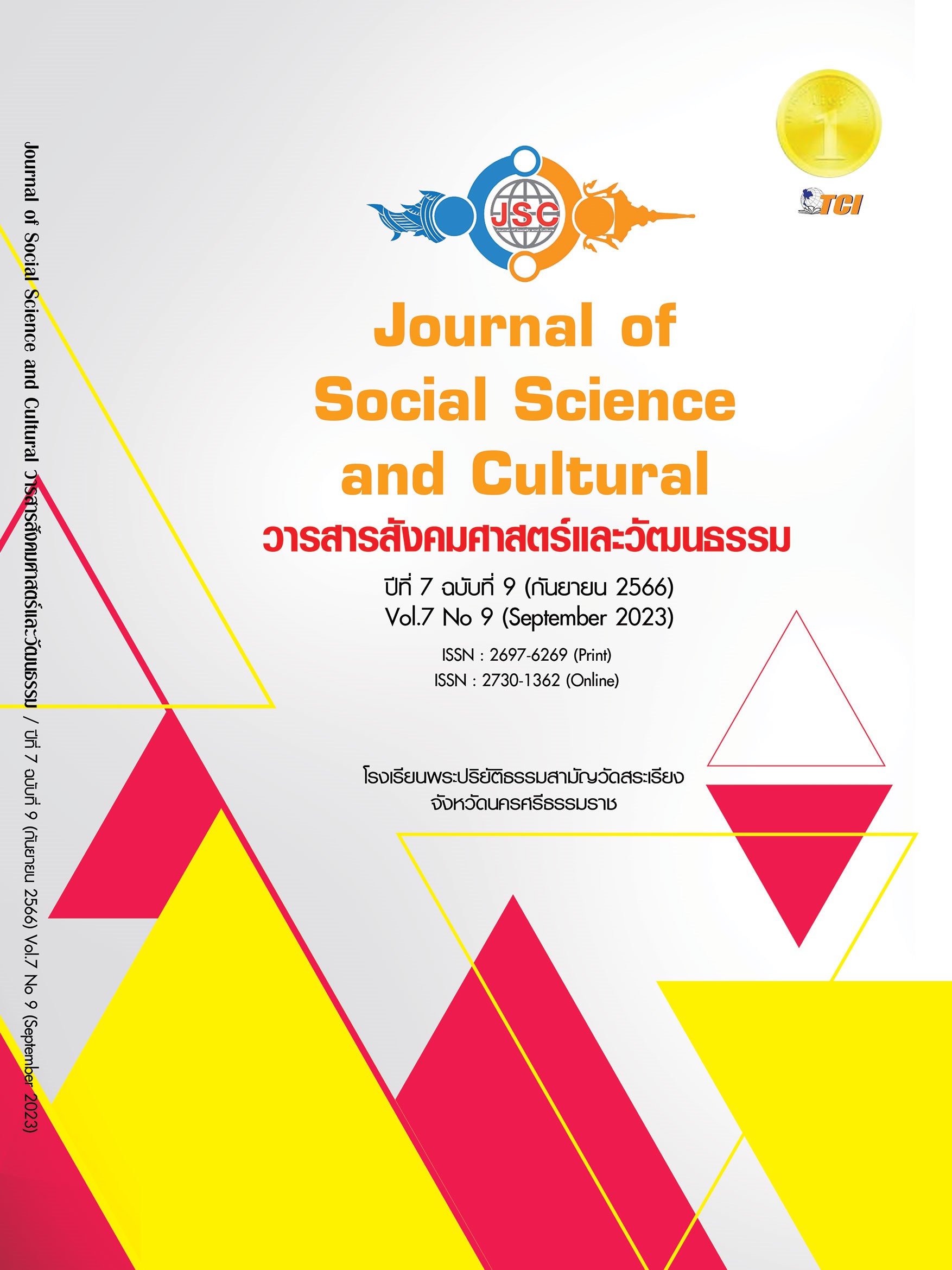THE DEVELOPMENT OF TRANSFORMATIVE ART LEARNING MODEL FOR ENHANCING PUBLIC MIND VALUE
Main Article Content
Abstract
The purpose of this research was to develop, use, and validate the transformation art learning model for enhancing public mind value. The learning model is generated by using the participatory learning and action research (PLAR) among six key stakeholder groups:
1) the art teachers 2) the community leaders 3) the academicians from non-government organizations and private sectors 4) the academicians from government organizations 5) the local artists 6) the students under bachelor’s degree program in visual art and design, who are involved in development and evaluate the learning model in 3 cycles. The sample groups were 25 students under bachelor’s degree program in visual art and design. The research instruments consisted of lesson plans, public mind values test, reflective dialogue, student satisfaction survey form and community satisfaction survey form. The results showed as follows: 1) The results of learning model development were found that the main principles of the transformative art learning model for enhancing public mind value are holistic learning management, connect students with the community, learning from a good role model, creating opportunities to use art knowledge for benefit of society, and internal reflection through art. 2) After implementing the learning model the results from public mind test revealed that the post-test mean scores of the sample groups were higher than the pre-test mean scores at a significant difference of .05 3) student reflect on their feelings of wanting to participate in contributing to society and take pride in applying art knowledge for society development 4) The community 's satisfaction toward the student 's artworks at the highest level 5) The student 's satisfaction toward learning model at high level.
Article Details
References
นฤมล จิตรเอื้อ และนรินทร์ สังข์รักษา. (2560). การให้ความหมาย ที่มาของความหมาย รูปแบบกิจกรรม และแนวทางการเสริมสร้างจิตสาธารณะของนักศึกษาคณะบริหารธุรกิจ มหาวิทยาลัยเทคโนโลยีราชมงคลธัญบุรี. วารสารอิเล็กทรอนิกส์ Veridian มหาวิทยาลัยศิลปากร (มนุษยศาสตร์สังคมศาสตร์และศิลปะ), 10(3), 2387-2404.
ประกาศกระทรวงศึกษาธิการ. (2558). เรื่อง มาตรฐานคุณวุฒิระดับปริญญาตรี สาขาศิลปกรรมศาสตร์ พ.ศ. 2558. ราชกิจจานุเบกษา เล่ม 136 ตอนพิเศษ 56 ง หน้า 7 (6 มีนาคม 2559).
ประกาศกระทรวงศึกษาธิการ. (2562). เรื่อง มาตรฐานคุณวุฒิระดับปริญญาตรี สาขาครุศาสตร์และสาขาศึกษาศาสตร์ (หลักสูตรสี่ปี) พ.ศ. 2558. ราชกิจจานุเบกษา เล่ม 136 ตอนพิเศษ 56 ง หน้า 12 (6 มีนาคม 2562).
พระราชบัญญัติการอุดมศึกษา. (2562). ราชกิจจานุเบกษา เล่ม 136 ตอนที่ 57 ก หน้า 58 (1 พฤษภาคม 2562).
ศตวรรษ มะละแซม. (2563). การพัฒนาหลักสูตรเสริมเพื่อเสริมสร้างจิตสาธารณะ ตามแนวคิดการเรียนรู้รับใช้สังคม และการเรียนรู้โดยใช้ชุมชนเป็นฐานสำหรับนักศึกษาปริญญาตรี. ใน ดุษฎีนิพนธ์ปรัชญาดุษฎีบัณฑิต สาขาวิชาวิจัยหลักสูตรและการสอน. มหาวิทยาลัยราชภัฏสกลนคร.
ศูนย์วิจัยและพัฒนานวัตกรรมการศึกษาเพื่อเด็กและผู้มีความต้องการพิเศษ คณะครุศาสตร์ จุฬาลงกรณ์ มหาวิทยาลัย. (2556). สถานการณ์และปัญหาของเด็กและเยาวชนในท้องถิ่น. เรียกใช้เมื่อ 1 มิถุนายน 2566 จาก http://www.dla.go.th/upload/ebook/column/2012/7/2013_5051.pdf
Mezirow, J., et al. (2009). Transformative learning in practice: Insights from community, workplace, and higher education. San Francisco: Jossey-Bass.
Molnar, M. (2010). Arts-based service learning: A curriculum for connecting students to their community. Tucson, AZ: University of Arizona.
Quisumbing, L. R. & de Leo, J. (2005). Learning to do: Values for learning and working together in a globalized world: an integrated approach to incorporating values education in technical and vocational education and training. Germany: UNESCO-UNEVOC International Centre for Technical and Vocational Education and Training.
Sevgi, K. & Victoria, W. T. (2012). Learning to Transform Oneself and Society Education for Sustainable Living Policies and practices from around the world. Hamar: Partnership for Education and Research about Responsible Living (PERL).
Sipos, Y., et al. (2008). Achieving Transformative Sustainability Learning: Engaging Head, Hands, and Heart. International Journal of Sustainability in Higher Education, 9(1), 68-86.
Trivic, Z., et al. (2020). Capacities and Impacts of Community Arts and Culture Initiatives in Singapore. The Journal of Arts Management Law and Society, 50(2), 1-30.
UNESCO. (2010). The Seoul Agenda: Goals for the development of arts education. Retrieved June 1, 2023, from http://portal.unesco.org/culture/en/ev.phpURL_ID=41117&URL_ DO=DO_TOPIC&URL _SECTIO N=201.html
UNESCO. (2015). Global Citizenship Education: Topics and learning objectives. Paris: UNESCO.


